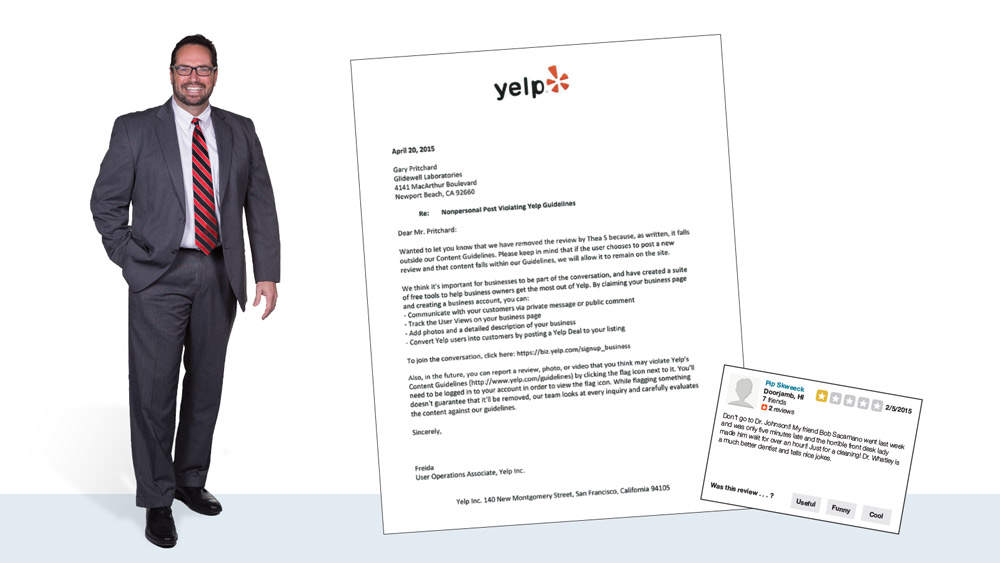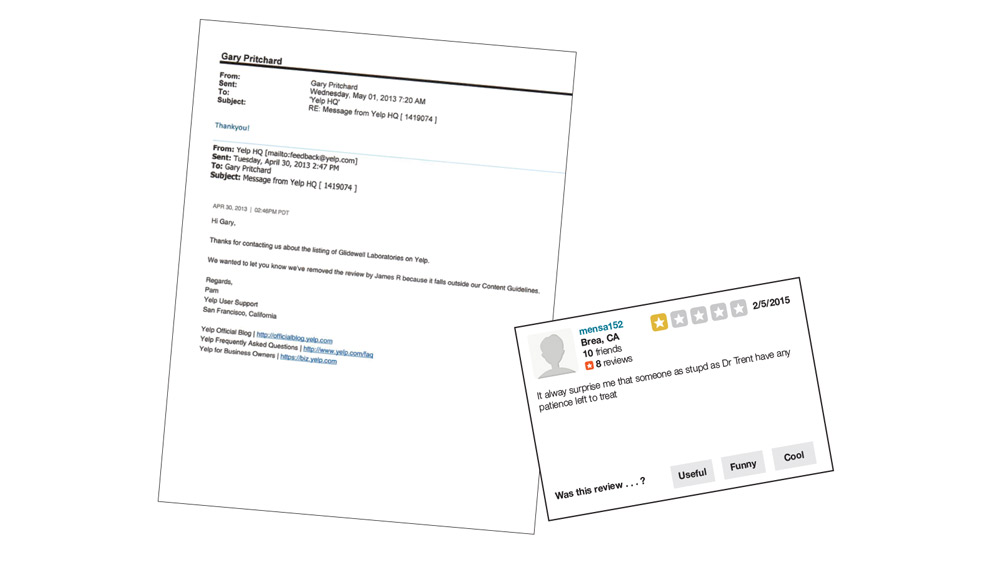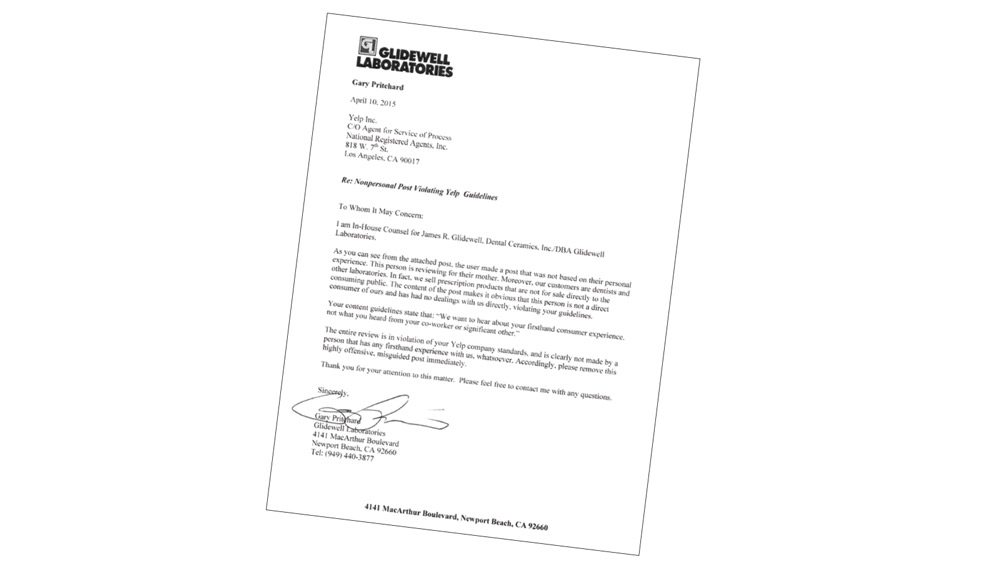Legal Matters – Yank the Yelp!
Yelp gives a powerful voice to every customer, satisfied or not. Unfortunately, it also gives that same power to every fake disgruntled customer, created by your competitor, who can write a fabricated review that is then read by the entire world. Well, spoiler alert: Although it does not happen very often, I’ve actually been successful in getting Yelp to remove several negative posts. And at the end of this article, I will provide you the actual form letter that I used to do so, as well as give you ideas for getting maximum effect from the form. That will be the goal for every one of my future columns in Chairside® magazine: to give you something you can actually use (after you consult with your own lawyer, of course), rather than muddle your mind with vague discussions of the law that may tease you into paying for my legal services. My services are not even for sale. I already have a great job. I work as in-house counsel for Glidewell Laboratories!
As a small-business owner in a vastly competitive industry, the stakes are incredibly high. Statistics show that each half-star rating can have a measurable impact on a business’s bottom line.1,2 A good Yelp rating can be worth a lot; a bad one, detrimental. My wife, for example, the toughest, smartest lawyer I know, always consults Yelp before trying a new restaurant. She won’t let us go to a restaurant with less than 4.5 stars. And that’s her standard for restaurants; imagine how tough she is on health care providers.
Regardless, I would typically take a certain amount of comfort in the fact that this is the United States of America, where if you are wronged, and you suffer damage, you can sue the individual who wronged you. Heck, you can sue anybody for anything. But can you win? Can you even identify the offending party? Courts are extremely hesitant to force internet providers to divulge the identities of people using their sites, and that’s if the true person can even be known by them. How much will it cost merely to identify the person actually responsible for the post? And even if you can identify the person responsible, recent case law suggests that the deck will be stacked against you in any lawsuit you bring, because the person is protected by law if he or she is simply stating an “opinion.” Moreover, the website itself is protected because it’s just posting third-party opinions.
Additionally, imagine bringing a lawsuit against someone who you believe has defamed you, only to end up having to pay that person’s attorney’s fees and damages. More states than not have laws that allow the poster of the offending message to file a counterclaim against you if your lawsuit is determined to be a strategic lawsuit against public participation, or SLAPP. That is, if your lawsuit is deemed to have intended to censor, intimidate or silence critics by burdening them with the cost of a legal defense until they abandon their criticism or opposition, you may find yourself paying a judgment to the person bringing the complaint.
A lawsuit can even prompt perpetrators to focus more on their “cyber terrorism” campaign against your business. Imagine an unemployed individual focusing his or her entire daily efforts on smearing you online. Moreover, even if you beat the odds and are successful in the lawsuit, is the person able to pay the judgment? Can you collect a judgment against the person? Would the judgment even exceed the amount you paid on your own attorney’s fees? All these reasons are why it is important to consult with a lawyer knowledgeable in this particular area of law before bringing a lawsuit. You don’t want a lawyer to just take your money and put you in a worse position than you were at the start.
Alternative to legal action, you can find a treasure trove of ideas on the internet for ways to improve your rating instead. I personally like the suggestion that you respond to every negative rating or, if you can’t do it yourself, assign someone to be in charge of responding to negative posts and researching ways to improve your Yelp account. The idea is based on the concept that your customers don’t expect you to be perfect, just to take their complaints seriously. Contact the customer (in person, if possible) and try to make that person’s experience satisfactory. Post your response. Let people know that you actively tried to resolve the complaint, and document the steps you took to do so, then be sure to request that the reviewer update his or her post. Silence in response to a complaint is tantamount to an admission of its validity. Notably, that’s the position the law takes also. Silence is not-so-golden!
However, on those occasions when you’re faced with a review that is particularly malicious or subversive, or reeks of ulterior motive, here are the steps I took to successfully remove a negative post.
First, I went to the Yelp website and studied its “general guidelines,” the area where it gives users the standards for posting on its site. I have summarized some of them here, but it would behoove you to look at the full list on the website. The idea is to show Yelp in your complaint letter that the offensive post is in violation of one of these guidelines. For example, one of its guidelines states that no threats, harassment, lewdness, hate speech or other displays of bigotry are allowed. From my experience, the last thing Yelp wants to do is allow a post that is offensive to someone (though you could argue any negative post is “harassment,” but that might just be the lawyer in me). So put your politically correct pants on because — and pay attention, this is important — if the harassment or discrimination ties into one of the legally protected categories (e.g., age, race, sex, disability, religion, national origin),3 you can substantially strengthen your complaint.
Employment lawyers are masters of this: twisting a negative comment into a claim of harassment or discrimination based on a protected category. Let me give you a few examples. Let’s say the complaint states that your dental equipment is “old and outdated.” Have they just made a derogatory comment about your age? Are you feeling harassed or discriminated against? Or suppose someone makes a complaint that your “fat” hygienist was mean. You could complain to Yelp that she felt harassed based on her disability (obesity is now a disability in and of itself), perhaps accompanied by a notarized statement from her to strengthen your Yelp letter. How about if someone complains that your front desk receptionist was rude, when in fact, in the course of seeking psychological treatment, she was prescribed medication that has mood-altering side effects? The customer has just made a complaint about your receptionist’s disability/medical condition. Are you understanding the program? Can you smell what I’m cooking?
Further Yelp guidelines can be equally helpful. Here are just a few ideas.
- Yelp states that reviews should not be written by competitors in your industry. You might not know who the review was written by, but if you suspect a competitor is behind the complaint, you should certainly point that out to Yelp, and provide any evidence to substantiate your position.
- Yelp says, “No commercial promotional content.” Therefore if the review has any reference to businesses or products other than yours, you have grounds for an objection. For example, if the review states that you don’t use the state-of-the-art TS150™ from IOS Technologies, Inc., you could object (or just treat yourself to one).
- Yelp states that the reviews aren’t the place for rants about a business’s employment practices, political ideologies, extraordinary circumstances, or other matters that don’t address the core of the consumer experience. Accordingly, you should complain about reviews by disgruntled former employees. You can be sure if it’s a complaint about your practice, it is an “extraordinary circumstance.” Use that!
- Yelp states that the reviews should not publicize other people’s private information, including full names. So if they use the personal names of either you or any of your employees in the negative review, complain.
- Yelp states the review should discuss firsthand consumer experiences only, so be sure to object to any review that says “my wife” or “my mother” or “my husband” received horrible treatment.
- Yelp states that all reviews should be factually correct. Well, if it’s negative, you know that some fact is missing! Objection! Back up your objection with the documented facts included in your letter.
One last point to note, which you can see in the attached letter, is that I address the letter to Yelp’s agent for service of process. I think that gives the letter some extra attention (provided you have the correct, current agent for service of process, which can be found through the website of the Secretary of State).4 However, note that in one of their response letters, they have informed me that emailing an objection to the website is another way to complain about a violation of their company standards. I think it’s a good idea to do both. Get two looks at your complaint. Also, use the shotgun complaint approach where you can. Make multiple complaints of the guideline violations where you can. Throw it all out there. Maybe something will stick.
Good luck! Email me if you have any questions or comments (or success!) with this advice.
*Communication of information in this content (1) is not provided in the course of and does not constitute an attorney-client relationship, (2) is not intended as a solicitation, (3) is not intended to convey or constitute legal advice, and (4) is not a substitute for obtaining legal advice from a qualified attorney. You should not act upon any such information without first seeking qualified, professional counsel on your specific matter.
References
- ^Anderson ML, Magruder J. Does Yelp Affect Restaurant Demand? ARE Update. 2013;16(5):1-4. University of California Giannini Foundation of Agricultural Economics.
- ^Luca M. Reviews, Reputation, and Revenue: The Case of Yelp.com. Harvard Business School Working Paper. 2011 Sep;No. 12-016.
- ^In all 50 states, federal law makes it illegal to discriminate based on:
-Race -Color -National origin -Religion -Sex (or gender-specific criteria, including pregnancy, childbirth and related medical conditions) -Disability -Age -Citizenship status -Genetic information
In addition, various state law also prohibits discrimination based on:
-Marital status -Sexual orientation and identity -Military or veteran status -Political activities or affiliations -AIDS/HIV -Medical condition -Status as a victim of domestic violence, assault or stalking
- ^At the time of writing, the current agent for service of process for Yelp is:
National Registered Agents, Inc. 818 W. 7th St., Ste. 930 Los Angeles, CA 90017









